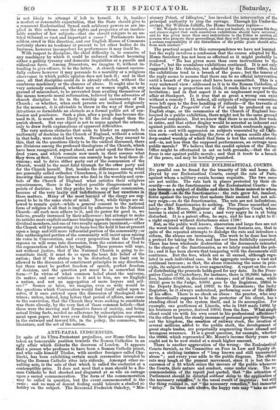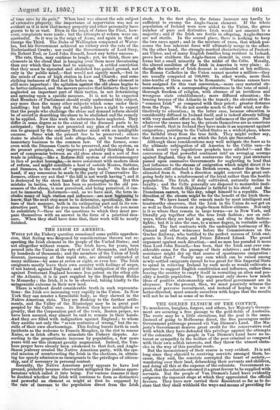HOW TO ABOLISH THE ECCLESIASTICAL COURTS. No parallel can be
found for the tenacity of life and home dis- played by our Ecclesiastical Courts, except the rats of Paris, against whom a military ramie became requisite. The two cases are not unlike. The rats lurk in places protected by their ob- scurity—so do the functionaries of the Ecclesiastical Courts : the rats become a subject of dislike and alarm to those nearest to whom they dwell—so do the functionaries.: the rats grow fat, insolent, fierce against the inquirer that molests their ancient but not soli- tary reign—so do the functionaries. The rats are not industrious, and the chief functionaries do nothing. The Times unearthed one lately—a Mr. Moore Registrar of the Prerogative Court, whose income is stated at 9O001. a year; and very angry he is at being disturbed. It is a patent office, he says, and he has a right to it : a right enjoyed without disturbance since 1799! Bat, as the public well knows, sinecurism and large fees are not the worst traits of these courts : those worst features are, that in spite of the repeated attempts to dislodge the rats and introduce a reform, the abuses are increasing. The work to be done has been a pretext for taking the fees, and has not been faithfully executed. There has been wholesale destruction of the documents intrusted to the charge of the functionaries, as we lately reminded the pub- lic; and it has been shown that tampering with the documents still continues. But the fees, which are so ill earned, although regu- lated in each individual case, in the aggregate undergo a vast and continual increase ; so that, the abuse remaining the same in prin- ciple its subject-matter is ever augmenting. A report on the mode of estributing the proceeds holds good for any date. In the Prero- gative Court of Canterbury, for instance, there is 30,800/. taken in fees, besides 6760/. in discount on stamps ; and of that sum, while 3923/. goes to the Judge, 85081. goes to the Registrar, 2803& to the Deputy Registrar, and 1992/. to the Examiners ; the lucky Registrar, be it always understood, performing none of the dEties of his office. There is no check on abuse : the proctor, who may be theoretically supposed to be the protector of his client, has a standing client in the system itself, and is its accomplice. For example, one gentleman at Lincoln, who in 1849 made 14001. by his business as proctor, derived 1095/. from the fees. What single client could vie with his own court in his professional affections? On the other hand, the steady increase of personal property through- out the kingdom the creation of railway stock, the creation of several millions ;aided to the public stock, the development of great staple trades, are perpetually augmenting these abused and wrongous revenues. It is a great question, for example, whether the 90001. which represented Mr. Moore's income thirty years ago ought not to be now stated at a much higher amount There is another aggravation of the 'wrong: the Ecelesiasticil Courts furnish, as the Committee on Fees in Law and Equity ob- serve, a striking instance of "long known and still uncorrected abuse " ; and every year adds to the public disgrace. The official rats may laugh at the present movement, since it is but the re- currence of a fit which seizes the movers of the public whenever the Courts, their nature and conduct, come under view. The re- commendation of the report just quoted, that "the attention of Parliament should be directed without delay to the application of the necessary remedies," is the usual result of inquiries ; but still the thing realized is, not "the necessary remedies," but immortal "delay." In those safe abodes, the happy rats may "take no note
of time save by its gain." When land was almost the sole subject of extensive property, the importance of supervision was not so evident as it is now that money property and other personalty have grown to be so vast. Even in the reign of James the First, how- ever, complaints were made ; but the attempts at reform were un- successful. So it was in the reign of Anne, and again in that of George the Third. The Duke of Wellington conquered at Water- loo, but his Government achieved no victory over the rats of the Ecclesiastical Courts ; nor could the Governments of Lord Grey, Sir Robert Peel, or Lord John Russell, boast any better success.
The rats, then, may continue to laugh ; yet, we think, there are elements in the cloud that is hanging over them more threatening than any which they have had to undergo. A settled conviction that they must be uprooted and abolished has gained ground, not only in the public mind,—that would not signify much,—but in the minds of men of high station in Law and Church; and some striking instances of that fact lie before la& The other element is still more important : the agitation against the old abase begins to be better-informed, and the movers perceive that hitherto they have neglected an important part of their tactics, in not determining and agreeing upon a specific measure. It is not to be expected that Members of Parliament should really understand this subject, any more than the many other subjects which come under their handling; but both they and the public have a right to expect that the people who challenge the abuse and demand reform should be of accord in describing the abuse to be abolished and the remedy to be applied. Now this work the reformers have neglected. They differ in some degree as to the extent of the diseased parts to be extirpated ; they have not presented any plan of reform which can be grasped by the ordinary Member mind with an intelligible oneness. Some wish the present law to be preserved ; others desire to abolish the civil code altogether, and to transfer tes- tamentary business to the common law. Of the former, some even wish the Diocesan Courts to be preserved, and the system, on its present principles, only improved : probably thinking that a sort of compromise between an old close abuse and a sort of free trade in jobbing,—like a Reform-Bill system of electionmongery in lieu of pocket boroughs,—is more consistent with modern ideas of reform, and might conciliate a host of outside Moores, Buttons, and Sumners, to the work of "opening the trade." On the other hand, if any concession be made to the party of Conservative Re- formers, others cry out that" the bill is not worth having"; and it is destroyed by the stern hands of the thoroughgoing. But this mistake in tactics, which has been so protective to the old pos- sessors of the abuse, is now perceived, and being perceived, it can- not be immortal. Reformers—and, as we have said, the term in- cludes many of high station and influence—are now beginning to know, that the next step must be to determine, specifically, the na- ture of their measure, both in its extirpating part and in its con- structive part. What do you mean to abolish? what do you mean to substitute ?—these are the questions to which they must pre- pare themselves with an answer in the form of a practical mea- sure. When they shall have done that, their work will be nearly finished.



























 Previous page
Previous page